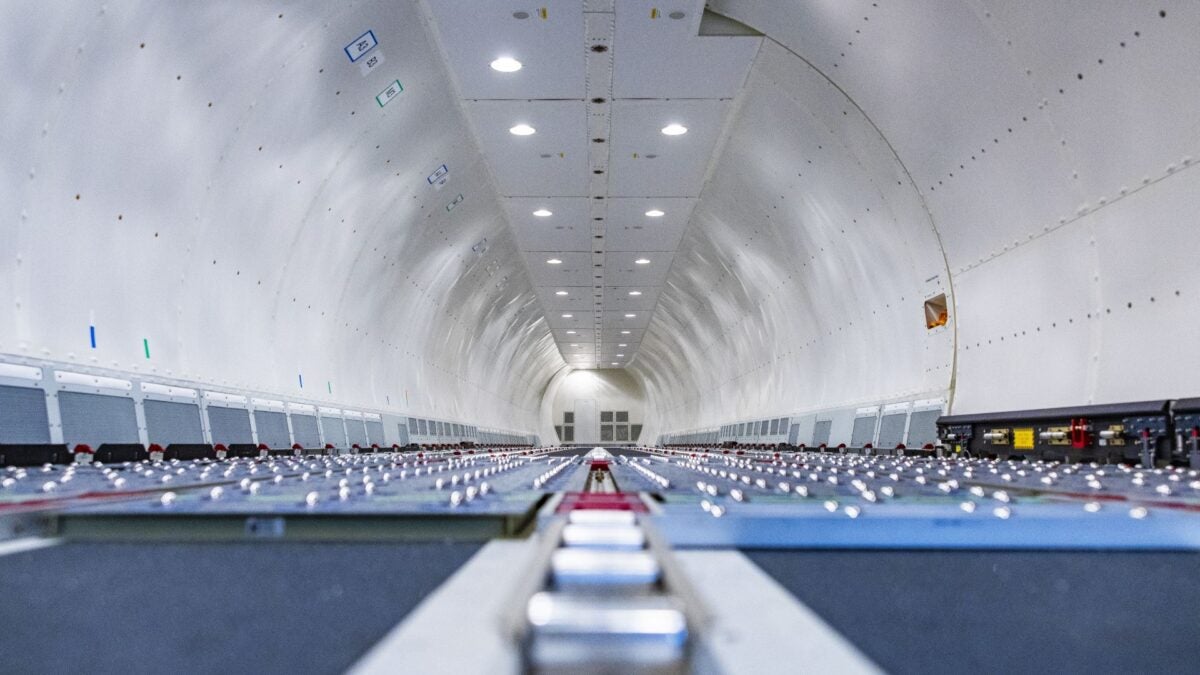LOUISVILLE, Ky. — Alaska Airlines will take advantage of two new Boeing 737-800 converted freighters to open its first dedicated cargo service south of Seattle, starting in April, said Adam Drouhard, managing director for cargo.
Los Angeles will be the newest market for the freighters, which currently don’t fly beyond Seattle in the Lower 48 states.
The newly modified aircraft will help Alaska Air Cargo broaden its market reach in Alaska, speed up deliveries and reduce stress on the airline’s three Boeing 737-700 converted freighters that currently serve the state.
By bringing on the new 737-800 cargo jets, “we’re making sure we’re getting reliability in our schedule, getting more balanced with our fleet. But it’s going to add a lot of capacity and growth. There will be about 70% more capacity in our network overall for the state,” Drouhard told FreightWaves at the AirCargo 2024 conference here this week. He spoke on the exhibit floor, where Alaska Airlines (NYSE: ALK) had a booth to showcase its transport service to freight shipping intermediaries.
In November, Boeing delivered one 737-800 passenger aircraft for all-cargo operations and is putting the finishing touches, including upgrading galley fixtures and a new paint job, on the second aircraft. Touch work on the planes, which came from Alaska’s passenger fleet, was done by Boeing’s airframe repair partners in Costa Rica and Canada.
The first plane is currently grounded for scheduled maintenance. Both cargo jets will be ready for service by mid-March, the cargo chief said.
The conversions were originally scheduled to be completed last year, but the aerospace industry is still plagued by shortages of skilled workers and supply chain challenges that have delayed production across the aftermarket freighter industry.
With five freighters in the fleet, Alaska Air Cargo will be better able to deliver medicine, household goods and fresh food to communities in Alaska, many of which have limited road access, while also moving seafood and other export commodities to cities across North America with passenger services that connect in Seattle and Los Angeles.
Each 737-800 freighter can carry 10,000 pounds more than a 737-700. With a configuration that also holds more containers, the -800s will have 40% additional space than their predecessors.
Widespread dependance on air service means the Alaska Airlines freighters make about seven departures per day, which is more taxing on the airframe and engines than flying at a constant speed and altitude. The 737-700s on some routes make three to five stops between Anchorage and Seattle. The planes also run about 10 hours per day. By reducing daily operating time to eight hours and the number of cycles, Alaska Air Cargo can extend their longevity, Drouhard explained.
“The uniqueness of that market up there is high cycle for us. So as we add two more aircraft to our fleet, it helps us right-size capacity so we’re not trying to solve so many stops off of one plane,” he said. “It also allows us to unbundle markets, so that way markets get much more dedicated capacity that’s not shared. We’re able to spread that schedule across more aircraft.”

The new Los Angeles destination will initially be connected to Alaska through Seattle, but management expects to launch direct flights between Los Angeles International Airport and cities in Alaska in 2025. Alaska Airlines currently averages three daily departures from Seattle to Alaska.
“As the new expansion gets going, we want to keep close to Seattle rotation-wise. It makes it simple for us. As we get this set in place, we’ll be looking at opportunities to go direct to Anchorage, or other places like King Salmon, Bethel, Nome or the Alaska North Slope,” said Drouhard.
The new freighters are also in the process of becoming certified for flying long distances over open water. The aircraft’s expanded range will allow the cargo team to explore new routes, such as a possible nonstop from King Salmon to Seattle.
Cargo revenue at Alaska Airlines was about $130 million in 2023, nearly flat with the prior year. The revenue performance was much better than that of most airlines, which experienced revenue declines of 25% to 50% last year because of tepid freight demand and overcapacity. The difference is that most airlines operate in the international freight market, where the downturn was most severe, whereas Alaska operates domestically.
Drouhard said he expected to generate 10% to 15% more cargo revenue in 2024 because of the larger cargo fleet.
RECOMMENDED READING:
Alaska Airlines to fly Amazon packages after completing Hawaiian buy







